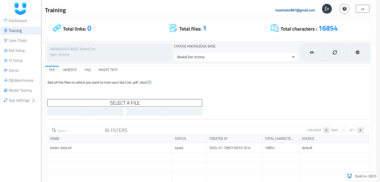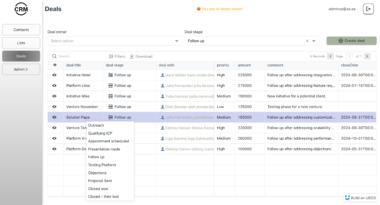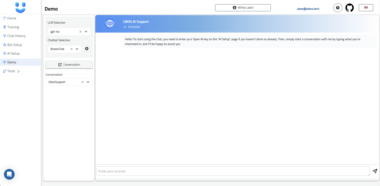Geekbot MCP



Unlock your Geekbot data within your LLM applications
Geekbot MCP (Model Context Protocol) server acts as a bridge, connecting LLM client applications (like Claude) directly to your Geekbot workspace. This allows you to interact with your standups, reports, and team members seamlessly within your conversations using natural language.
Key Features 
- Access Standup Information: List all standups in your Geekbot workspace.
- Retrieve Standup Reports: Fetch reports with filters for specific standups, users, or date ranges.
- View Team Members: Get a list of members you collaborate with in Geekbot.
Installation 
Requires Python 3.10+ and uv.
Install uv (if you haven’t already):
curl -LsSf https://astral.sh/uv/install.sh | sh(See uv installation docs for more options.)
Install Geekbot MCP:
uv tool install geekbot-mcp
Upgrading 
To update to the latest version:
uv tool install --upgrade geekbot-mcp
Configuration 
Connect Geekbot MCP to your LLM (e.g., Claude Desktop):
Get your Geekbot API Key: Find it in your Geekbot API/Webhooks settings
.
Find your
uvexecutable path:which uvConfigure your LLM client application: Edit your
claude_desktop_config.json(or equivalent configuration file for other MCP clients) to add Geekbot MCP server{ "globalShortcut": "", "mcpServers": { // Add or update this section "geekbot-mcp": { "command": "<path-returned-by-which-uv>", // Replace with your actual uv path "args": [ "tool", "run", "geekbot-mcp" ], // Environment variables needed by the server "env": { "GB_API_KEY": "<your-geekbot-api-key>" // Replace with your actual API key } } // ... other MCP servers if any } // ... other configurations }(Refer to the MCP Quickstart for more details on client configuration.)
Usage 
Once configured, your LLM client application will have access to the following tools and prompts to interact with your Geekbot data:
Tools 
list_standups
Purpose: Lists all the standups accessible via your API key. Useful for getting an overview or finding a specific standup ID.
Example Prompt: “Hey, can you list my Geekbot standups?”
Data Fields Returned:
id: Unique standup identifier.name: Name of the standup.channel: Associated communication channel (e.g., Slack channel).time: Scheduled time for the standup report.timezone: Timezone for the scheduled time.questions: List of questions asked in the standup.participants: List of users participating in the standup.owner_id: ID of the standup owner.fetch_reports
Purpose: Retrieves specific standup reports. You can filter by standup, user, and date range.
Example Prompts:
- “Fetch the reports for submitted yesterday in the Retrospective.”
- “Show me reports from user John Doe for the ‘Weekly Sync’ standup.”
- “Get all reports submitted to the Daily Standup standup after June 1st, 2024.”
Available Filters:
standup_id: Filter by a specific standup ID.user_id: Filter reports by a specific user ID.after: Retrieve reports submitted after this date (YYYY-MM-DD).
before: Retrieve reports submitted before this date (YYYY-MM-DD).
Data Fields Returned:
id: Unique report identifier.reporter_name: Name of the user who submitted the report.reporter_id: ID of the user who submitted the report.standup_id: ID of the standup the report belongs to.created_at: Timestamp when the report was submitted.content: The actual answers/content of the report.list_members
Purpose: Lists all team members you share standups with in your Geekbot workspace.
Example Prompt: “Who are the members in my Geekbot workspace?”
Data Fields Returned:
id: Unique member identifier.name: Member’s full name.email: Member’s email address.role: Member’s role within Geekbot (e.g., Admin, Member).
Prompts 
weekly_rollup_report
Purpose: Generates a comprehensive weekly rollup report that summarizes team standup responses, highlights key updates, identifies risks and mitigation strategies, outlines next steps, and tracks upcoming launches.
Arguments:
standup_id: ID of the standup to include in the rollup report.
Development 
Interested in contributing or running the server locally?
Setup Development Environment
# 1. Clone the repository
git clone https://github.com/geekbot-com/geekbot-mcp.git
cd geekbot-mcp
# 2. Install uv (if needed)
# curl -LsSf https://astral.sh/uv/install.sh | sh
# 3. Create a virtual environment and install dependencies
uv sync
Running Tests 
# Ensure dependencies are installed (uv sync)
pytest
Contributing 
Contributions are welcome! Please fork the repository and submit a Pull Request with your changes.
License 
This project is licensed under the MIT License.
Acknowledgements 
- Built upon the Anthropic Model Context Protocol framework.
- Leverages the official Geekbot API.
Geekbot MCP
Project Details
- geekbot-com/geekbot-mcp
- MIT License
- Last Updated: 4/13/2025
Recomended MCP Servers

council of models for decision
a powerful coding agent toolkit providing semantic retrieval and editing capabilities (MCP server & Agno integration)
MCP Server para gerenciar o Memory Bank
Put an end to code hallucinations! GitMCP is a free, open-source, remote MCP server for any GitHub project

Allows AI Agents to sleep for a specified amount of milliseconds, like when they should wait for an...


Playwright Model Context Protocol Server - Tool to automate Browsers and APIs in Claude Desktop, Cline, Cursor IDE...
MCP Server implementation for the Model Context Protocol (MCP) enabling AI tool usage - Realtime Flight Search
A complete walkthrough on how to build an MCP server to serve a trained Random Forest model and...
Model Context Protocol with Neo4j











